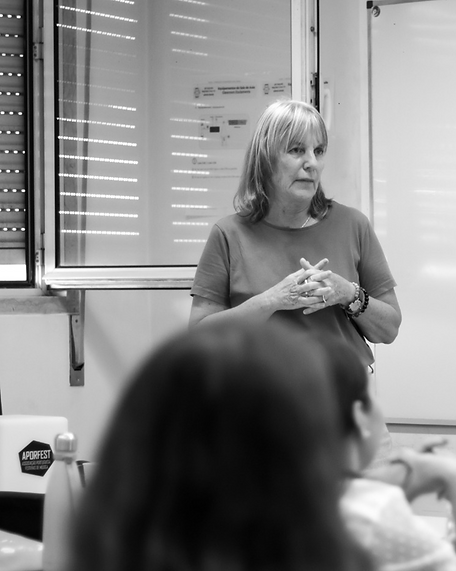


In today’s music festival sector, growing competition—both nationally and internationally—demands continuous innovation and higher standards in production and professionalization. This challenge is especially pronounced at large-scale festivals, where operational complexity is high and involves managing renowned artists, specialized technical teams, and multiple stakeholders.
Excellence in event organization requires highly skilled professionals proficient not only in the visible aspects of live entertainment but also in the intricate structures that operate behind the scenes. This training session delivers a practical, detailed overview of every critical area in festival production—from backstage and dressing rooms to catering, press, and VIP operations—empowering participants with up-to-date knowledge of the industry’s best practices.
Designed for both current professionals and newcomers to the industry, this training session is a unique opportunity to gain essential expertise, expand your network, and develop a hands-on understanding of what goes on behind the scenes at major music festivals.
CONTENT
1. Overview of backstage operations and essential artist rider concepts.
2. Planning and protocols: rider decoding, structural and A&B logistics, budgeting, and supplier approvals.
3. Event setup: stage assembly, ambience creation, catering, and production room supplies.
4. Technical preparations: load-in, soundcheck, and rehearsals.
5. Show day management: artist logistics, reception, backstage supervision, and event closure.
6. Adaptations in procedures due to the post-pandemic context.
7. Practical case studies showcasing different event types.
8. Group knowledge sharing and discussion for applied learning.
LANGUAGE
Portuguese
OBJECTIVES
-
Equip participants with practical skills to manage all backstage areas, including dressing rooms, catering, press, and VIP zones.
-
Enable understanding of technical planning and logistics essential to smooth festival production operations.
-
Provide real-world case studies to develop problem-solving abilities and industry insights.
-
Promote professional networking and knowledge sharing to foster career growth in the live music event sector.
TARGET AUDIENCE
-
Bands and artists
-
Managers and others involved in festival management and music promotion/production in general
-
Media partners
-
Students and professionals in management, marketing, and communication
-
Festival promoters
-
Radio broadcasters, journalists, and photographers
-
Roadies and band members
-
Sponsors / Brands
PEDAGOGICAL METHODOLOGY
Demonstrative and participatory
Capacity: 30 participants
INCLUDED
Welcome bag + Participation Certificate + coffee station + VIP Access Talkfest - Music Fest Summit 2026
SAVE YOUR SPOT
Atualmente, no setor dos festivais de música, a crescente concorrência e competitividade, tanto a nível nacional como internacional, exigem um esforço contínuo para se destacar e elevar os padrões de produção e profissionalização. Este desafio torna-se ainda mais evidente nos grandes festivais, onde a complexidade operacional é elevada e envolve a gestão de artistas de renome, equipas técnicas especializadas e múltiplos stakeholders.
Para garantir a excelência na organização destes eventos, torna-se essencial formar profissionais altamente capacitados, não apenas para os aspetos visíveis do espetáculo, mas também para a complexa estrutura de produção que ocorre nos bastidores. A ação formativa oferece uma abordagem prática e detalhada sobre os diferentes setores críticos da produção de festivais, incluindo backstage, camarins, catering, área de imprensa e área VIP, proporcionando aos participantes um conhecimento aprofundado e atualizado sobre as melhores práticas da indústria.
Dirigido a profissionais e aspirantes a atuar no setor, esta é uma oportunidade única para adquirir competências essenciais, estabelecer contactos estratégicos e compreender os bastidores dos festivais de música de forma aprofundada e prática.
CONTEÚDO
1. Visão geral das operações de backstage e conceitos essenciais do rider artístico.
2. Planeamento e protocolos: decifração do rider, logística estrutural e de A&B, orçamento e aprovação de fornecedores.
3. Montagem do evento: construção do palco, criação do ambiente, catering e abastecimento da sala de produção.
4. Preparações técnicas: load-in, passagem de som e ensaios.
5. Gestão no dia do evento: logística de artistas, receção, supervisão do backstage e encerramento.
6. Adaptações dos procedimentos no contexto pós-pandemia.
7. Estudos de caso práticos ilustrando diferentes tipos de evento.
8. Partilha de conhecimento em grupo e discussão para aprendizagem aplicada.
IDIOMA
Português
OBJETIVOS
-
Dotar os participantes de competências práticas para gerir todas as áreas de backstage, incluindo camarins, catering, imprensa e zonas VIP.
-
Promover a compreensão do planeamento técnico e da logística essenciais para o bom funcionamento dos festivais.
-
Apresentar estudos de caso reais para desenvolver capacidades de resolução de problemas e conhecimento do setor.
-
Incentivar o networking profissional e a partilha de conhecimento para impulsionar o crescimento na carreira em eventos musicais ao vivo.
METODOLOGIA PEDAGÓGICA
Demonstrativa e Participativa
Capacidade: 30 alunos
DESTINATÁRIOS
-
Bandas e artistas
-
Managers e outros envolvidos na gestão de festivais e promoção/produção da música em geral
-
Media partners
-
Estudantes e Profissionais nas áreas de: gestão, marketing e comunicação
-
Promotoras de festivais
-
Radialistas, jornalistas e fotógrafos
-
Roadies e elementos de bandas
-
Sponsors/Marcas
INCLUÍDO
Welcome bag + certificado de participação + coffee station + acesso VIP ao Talkfest - Music Fest Summit 2026
RESERVE O SEU LUGAR

ABOUT
THE TRAINER
INGRID BERGER
With over 25 years in event production, Ingrid began as a band interpreter before moving into production, specializing in artist care, dressing rooms, and catering.
She is now a leading backstage producer, overseeing all behind-the-scenes operations including production offices, dressing rooms, catering, press, and VIP areas. Ingrid has worked on major festivals like Free Jazz, Hollywood Rock, Monster of Rock, UMF, Lollapalooza, and Festival de Verão Salvador, and has coordinated dressing rooms for more than 20 years at Rock in Rio (Lisbon, Madrid, Las Vegas, Rio de Janeiro). She has supported international shows featuring Madonna, Beyoncé, Iron Maiden, Paul McCartney, Rolling Stones, and more.
Her extensive backstage experience revealed a market gap for specialized backstage training, inspiring her to develop a training session to share practical knowledge unavailable elsewhere.

20 MARCH 2026
9h30/13h00 - 14h30/18h00

HOTEL MELIÃ AEROPORTO
AEROPORTO INTERNACIONAL DE LISBOA, RUA C Nº 2, 1749-125 LISBOA
_edited.png)
FORMAT
IN PERSON
